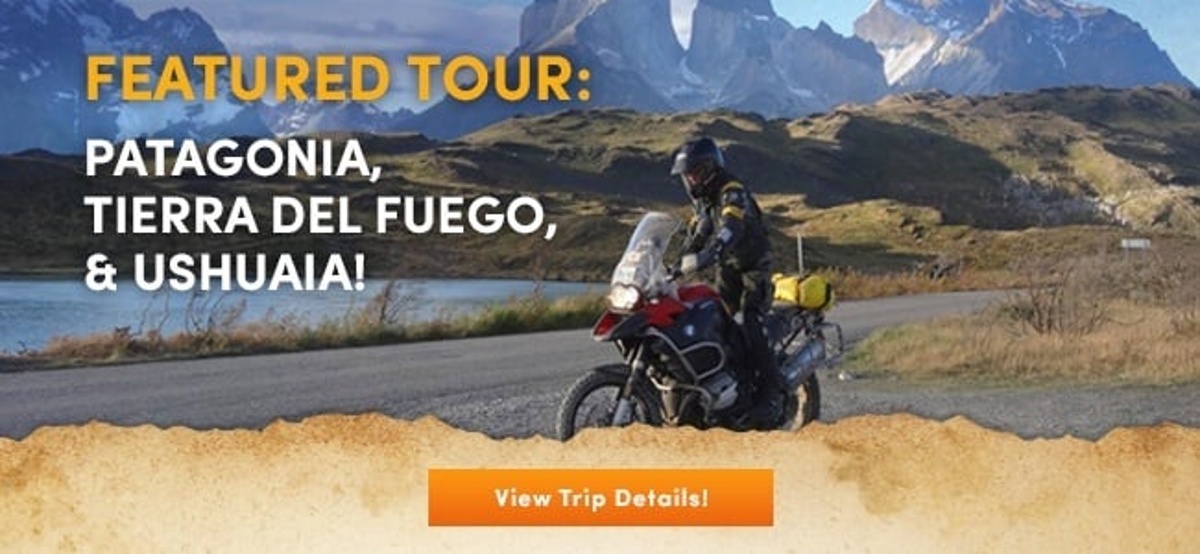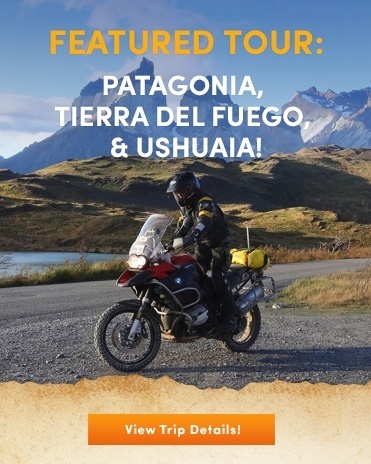 Disclosure: RIDE Adventures is a participant in the Amazon Services LLC Associates Program as well as other affiliate programs, designed to provide a means for us to earn fees by linking to Amazon and affiliated sites at no extra cost to you. Please see our Disclosure for more details.
Disclosure: RIDE Adventures is a participant in the Amazon Services LLC Associates Program as well as other affiliate programs, designed to provide a means for us to earn fees by linking to Amazon and affiliated sites at no extra cost to you. Please see our Disclosure for more details.
When it comes to safety meets style, nothing handles both jobs quite as well as a leather motorcycle racing jacket. Here's how to pick your next one.
While adventure touring is our bread and butter here at RIDE, ADV gear isn't the best option for every kind of riding.
Whether you're blasting around your local canyon roads or running errands in the city, nothing looks quite as sharp and protects quite as well as a proper motorcycle racing jacket.
Leather and motorcycles have gone hand-in-hand for the better part of a century, but not all racing jackets are created equal. Here are a few of our favorites and what to look for when buying your own.
Quick List of Motorcycle Racing Jackets
| Jacket: | Summary: | Price: |
|
Alpinestars GP Plus R V4 Rideknit |
Incredibly comfortable, flexible jacket with outstanding breathability. | CHECK PRICE |
|
Dainese Racing 4 |
High-performance perforated jacket that's ideal for the warmer months. | CHECK PRICE |
|
Cortex Chicane |
A well-rounded, handsome racing jacket for under $300. | CHECK PRICE |
|
Rev'It! Argon 2 |
Premium build and AAA protection at a more attractive price point. | CHECK PRICE |
|
Alpinestars Blacktrack |
Understated cafe-style jacket for folks who don't want or need track-inspired features. | CHECK PRICE |
What to Look For in A Motorcycle Racing Jacket
So you've decided to add that centerpiece of two-wheeled gear to your collection, the coveted motorcycle racing jacket. These jackets can be a big investment, so here's how to ensure your money is well spent.
Street, Track, or Both?
Riders have two main reasons for wanting a motorcycle racing jacket: Either they think they look sweet, they're going racing, or some combination of the two.
To that end, we recommend first asking yourself what you intend to use your jacket for: Track time, street riding, or as a functional accessory that looks good when you're out on the town.
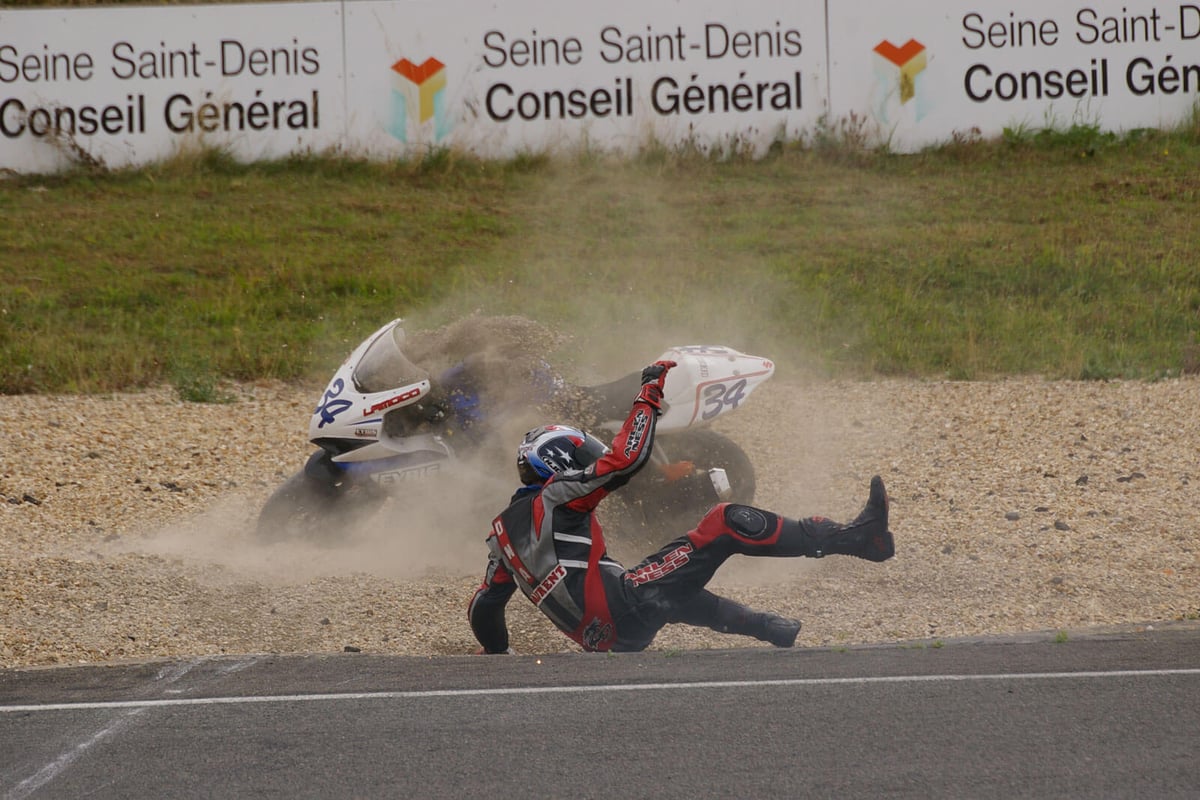 "If you're considering doing some track time in your jacket, it needs to be highly protective and compatible with racing pants."
"If you're considering doing some track time in your jacket, it needs to be highly protective and compatible with racing pants."If you're planning on doing any actual racing or track days in your jacket, you need to start your search by making sure your motorcycle racing jacket of choice is compatible with a pair of race pants, aka it works as a "two-piece" race suit.
That's because while most race tracks allow two-piece suits for "casual" use, pretty much all of them require the jacket and pants to be physically connected by a zipper.
Whether you opt to buy a full two-piece race suit or mix and match your jacket and pants is up to you. We'd recommend sourcing both from the same brand, however, to ensure the top and bottom zippers are compatible.
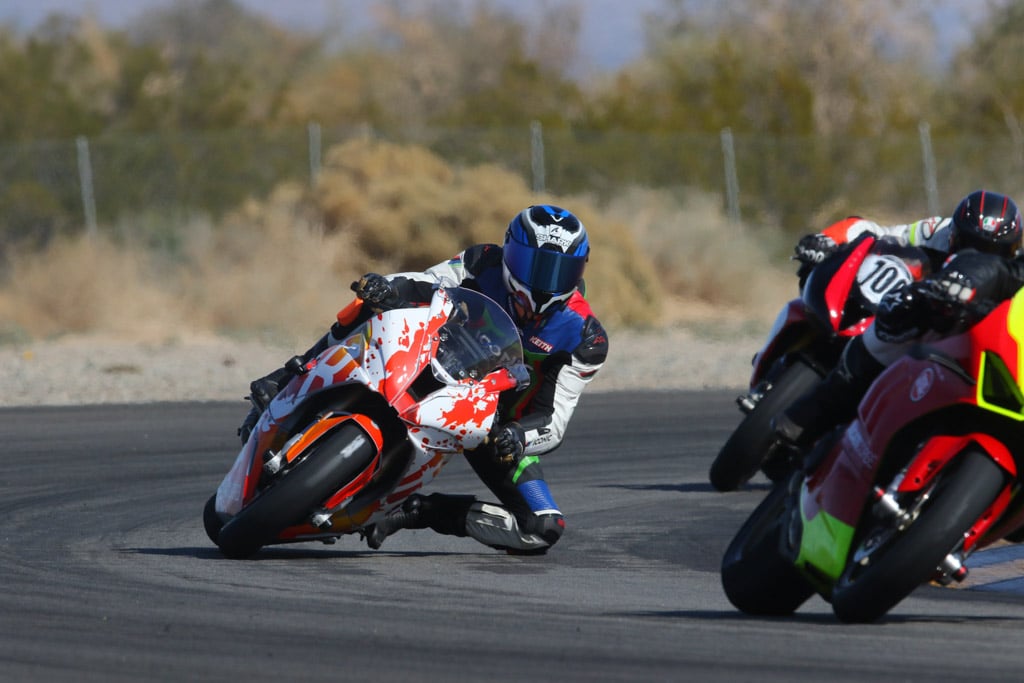 "Keith, one of our Team RIDE riders racking up the track days"
"Keith, one of our Team RIDE riders racking up the track days"Many even include a secondary zipper as part of the package, which you can then have sewn into your riding pants of choice.
If you have no plans to wear your motorcycle racing jacket on an actual race track, you're wide open to select whatever jacket suits your fancy. There's more than just style that goes into the selection of either type of jacket though, so let's touch on those briefly.
Racing Jacket Material Choice: Solid Leather, Perforated, and Textiles
Race jackets are, by definition, leather jackets, as no other material available offers quite the strength, abrasion resistance, and "multi-crash" performance as full-grain leather.
Whether that's cowhide, kangaroo, or bison is up to you (each has its benefits), but full-grain leather is the only serious choice for a race jacket.
With that being said, you'll see a few different flavors of leather out there. Apart from the different sources described above, the main concern here is whether you want your leather solid or perforated.
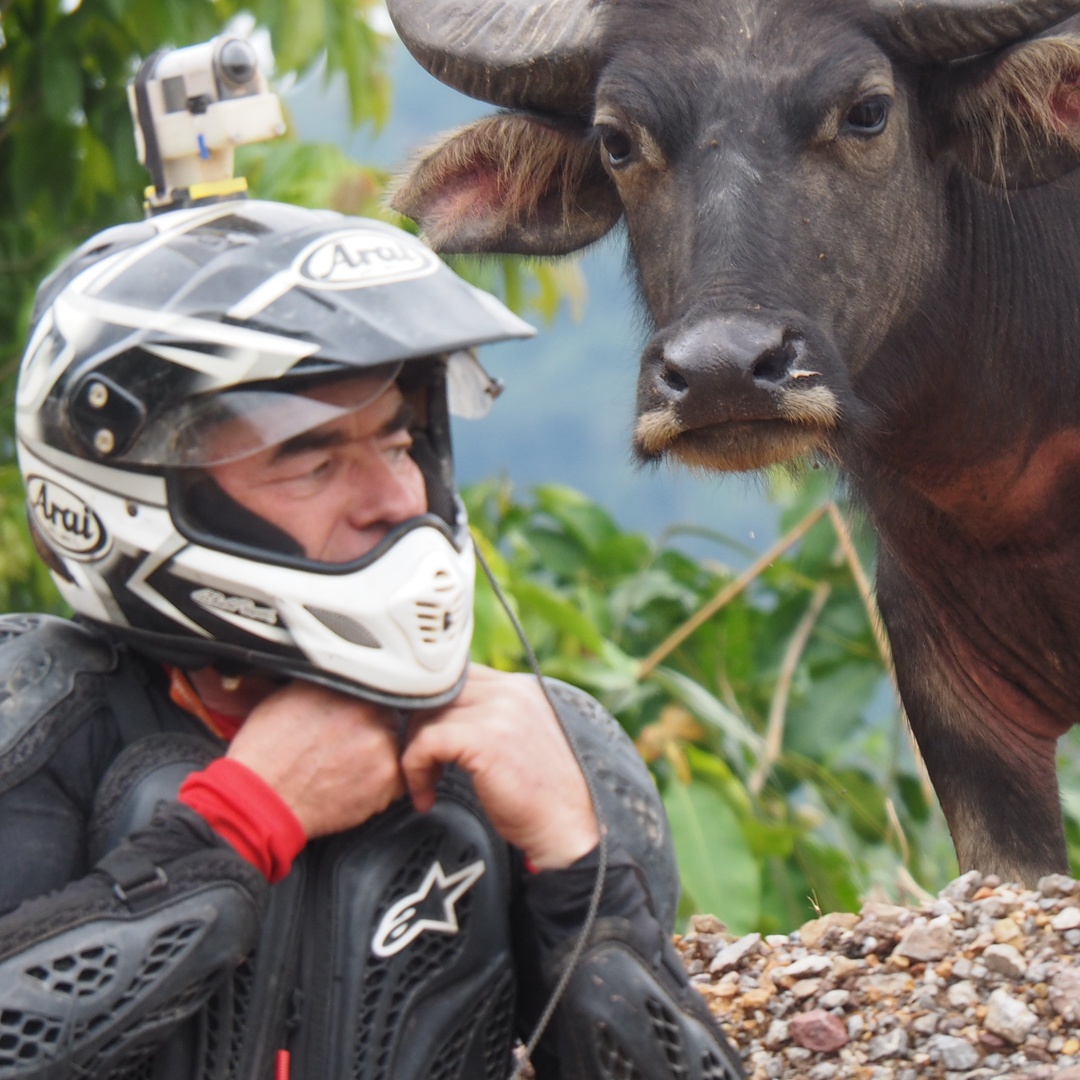 "Leather is a must for racing jackets... Apologies to our all four-legged friends."
"Leather is a must for racing jackets... Apologies to our all four-legged friends."Solid leather, as the name suggests, is free of any perforations and features minimal airflow or ventilation. This type of leather is ideal for cool-to-cold weather riding, as it does the best job of keeping body heat in and cold air out.
Perforated leather, on the other hand, is a popular option for three-season riders who want the look and protection of leather, but also want some added airflow for comfort in warmer or more active conditions.
While swamp ass is pretty much unavoidable in leather pants of any description, the tiny holes punched in perforated leather jackets up the airflow without sacrificing any safety chops, making this the best option for most riders in most conditions.
The amount of perforation found in any given jacket differs wildly, but as a general rule of thumb, more holes = more airflow = less sweat.
 "Leather tends to run hot, so if you're riding in warmer climates, perforated leather is the only serious choice."
"Leather tends to run hot, so if you're riding in warmer climates, perforated leather is the only serious choice."Last but not least, a word on textiles: More and more often, manufacturers like Alpinestars, Dainese, and Rev'It are finding creative ways to work flexible and breathable textiles into the designs of motorcycle racing jackets.
You'll often see these materials in "non-critical" areas like the armpits and forearms of jackets, and in our experience, this blend of leather and textile makes for the most comfortable construction money can buy.
While solid leather gussets do a great job of handling flexibility for cold-weather jackets, we highly recommend looking for a motorcycle racing jacket with as much stretch textile in the mix as your budget allows.
The style isn't for everyone, but from a performance standpoint, these panels are worth every penny.
Impact Protection on your Motorcycle Racing Jacket
Whether your motorcycle racing jacket is designed for track use or not, pretty much every jacket in this category benefits from trickle-down safety technology derived from the highest levels of racing.
That means these jackets are some of the most protective garments money can buy, but you'll still want to pay attention to both the type and level of impact protection that's included in any jacket you're considering.
The most basic type you'll find is integrated body armor, which has become more protective, more flexible, and less bulky than ever before thanks to malleable composites like D30 or proprietary systems like Alpinestars' Nucleon Flex armor.
At minimum, your jacket should include flexible CE/EN certified protectors in both the shoulders and elbows, as well as compatibility with a back protector insert (we prefer standalone protectors, but that should be optional, not mandatory).
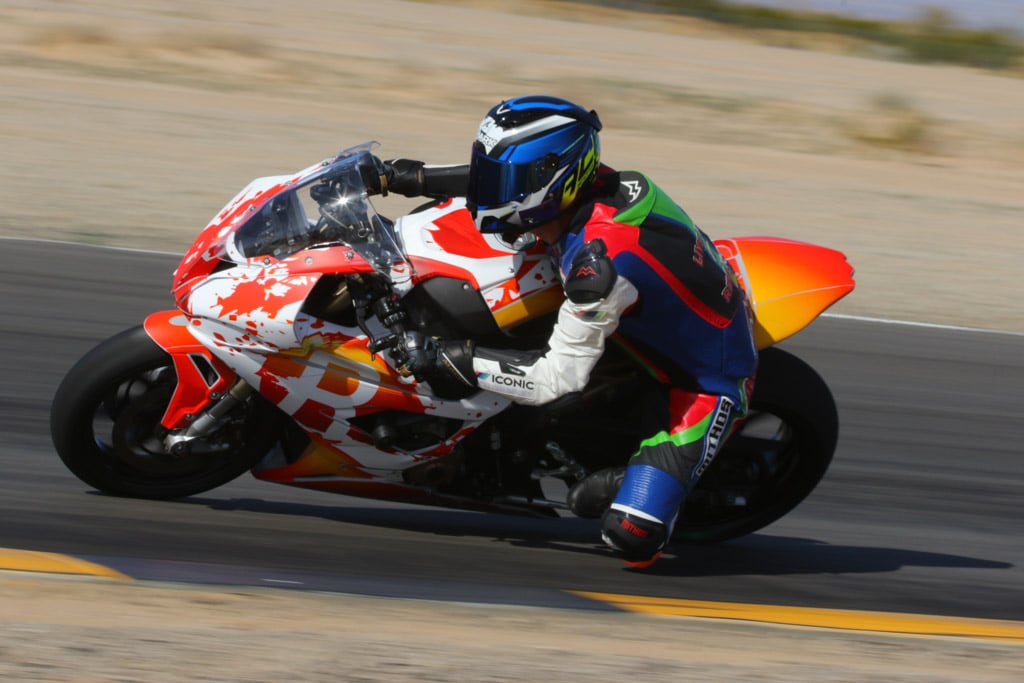
Another major safety feature to look out for is hard sliders, which are generally found in the shoulders and/or elbows of more "tech-savvy" motorcycle racing jackets.
Sliders are made from either TPU or metal, but both types serve the same purpose: To keep you from breaking bones in the event of a crash.
The thought of a two-inch hunk of plastic or titanium standing between you and a full-body cast may sound far-fetched, but there's a reason every rider on the MotoGP grid has sliders on their leathers.
As the name suggests, this added material is meant to "slide" over rough surfaces (asphalt) rather than snagging on the pavement, which helps prevent your jacket from "grabbing" the surface and sending you into a bone-breaking tumble.
If protection is your main priority and you've got the cash to spend, this tech shouldn't be overlooked. As we're fond of saying here at Ride Adventures, even the most expensive gear is cheaper than the average hospital bill.
Our Top Picks for Motorcycle Racing Jackets
Keeping the above factors in mind, we've got a few favorite motorcycle racing jackets we'd like to highlight for your perusal. These are the five models we'd buy ourselves, representing the cream of the crop in terms of safety, comfort, and value.
1. Alpinestars GP Plus R V4 Rideknit
The Alpinestars GP Plus R V4 Rideknit is probably the most comfortable racing jacket we've ever worn.
Between its cutting-edge "Rideknit" fabric and Alpinestars' unique A-CS stretch panels, this jacket moves and breathes like a second skin.
We're particularly impressed with the Rideknit material, which is highly protective while also being highly breathable and stretchy. It feels a lot like wearing a thick base layer, which is pretty incredible considering it'll handle a slide on pavement.
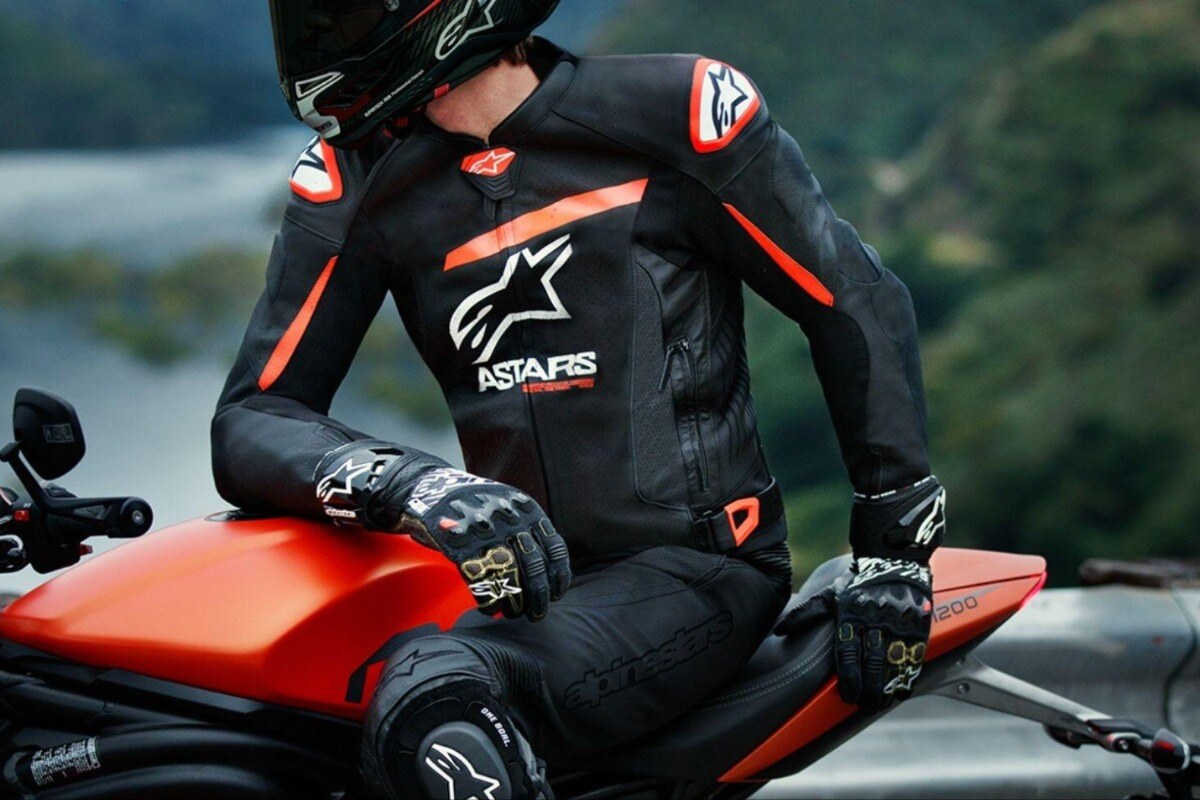 "We can't overstate how freely this jacket moves or how well it flows air."
"We can't overstate how freely this jacket moves or how well it flows air."The V4 also scores high marks for overall safety, earning a AA CE certification with its thick 1.3mm leather, GP Lite elbow armor, and super-comfortable Nucleon Flex Plus shoulder protection. Additional hard sliders on the shoulders are also a nice touch.
As for drawbacks, the main one here is price, as you're buying a health sample of Alpinestars' latest and greatest technology. We'll also note that seasonality limits the V4's versatility, as this is definitely not a cold-weather jacket.
PROS |
CONS |
|
|
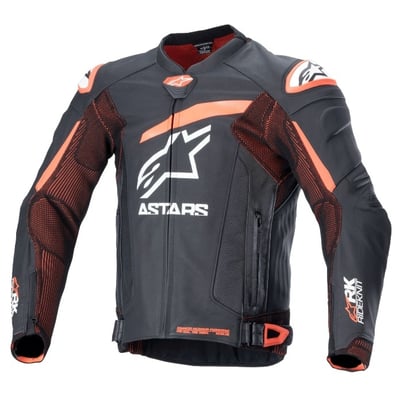
CHECK PRICE:
Alpinestars GP Plus R V4 Rideknit Jacket
2. Dainese Racing 4 Perforated Jacket
Dainese knows its way around leather. The brand's motorcycle racing jackets and suits are coveted around the world for their keen eye to quality and comfort, and the Racing 4 is our favorite option of the bunch.
That's because Dainese constructs the entire garment from premium Tutu cowhide, which is one of the softest and most supple options out there that also benefits from a water-repellent treatment for added wet weather performance and longevity.
The Racing 4 also stands out as one of the most effectively perforated jackets money can buy, with ample airflow coming through nearly every panel of the jacket.
In terms of safety, the 1.2 mm-thick cowhide is backed with EN-certified protectors at the shoulders and elbows, as well as replaceable aluminum sliders at the crests of both shoulders.
The Racing 4 also includes a full-length zipper attachment for racing pants, so while this is a handsome (and handsomely protective) option for the street, it's also fit for track duty when called upon.
PROS |
CONS |
|
|
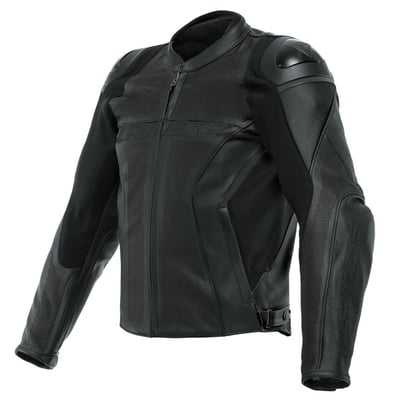
CHECK PRICE:
Dainese Racing 4 Perforated Jacket
3. Cortech Chicane Leather Jacket
Few brands can match the outright value of Cortech, and their Chicane motorcycle racing jacket is a prime example of that. This jacket delivers serious quality for under $300, making it the most attractive option on our list for the budget-conscious.
For your money you're getting full-grain buffalo leather construction, perforated chest and back panels, stretchy and breathable fabric in the underarm/forearm area, and even a removable thermal liner.
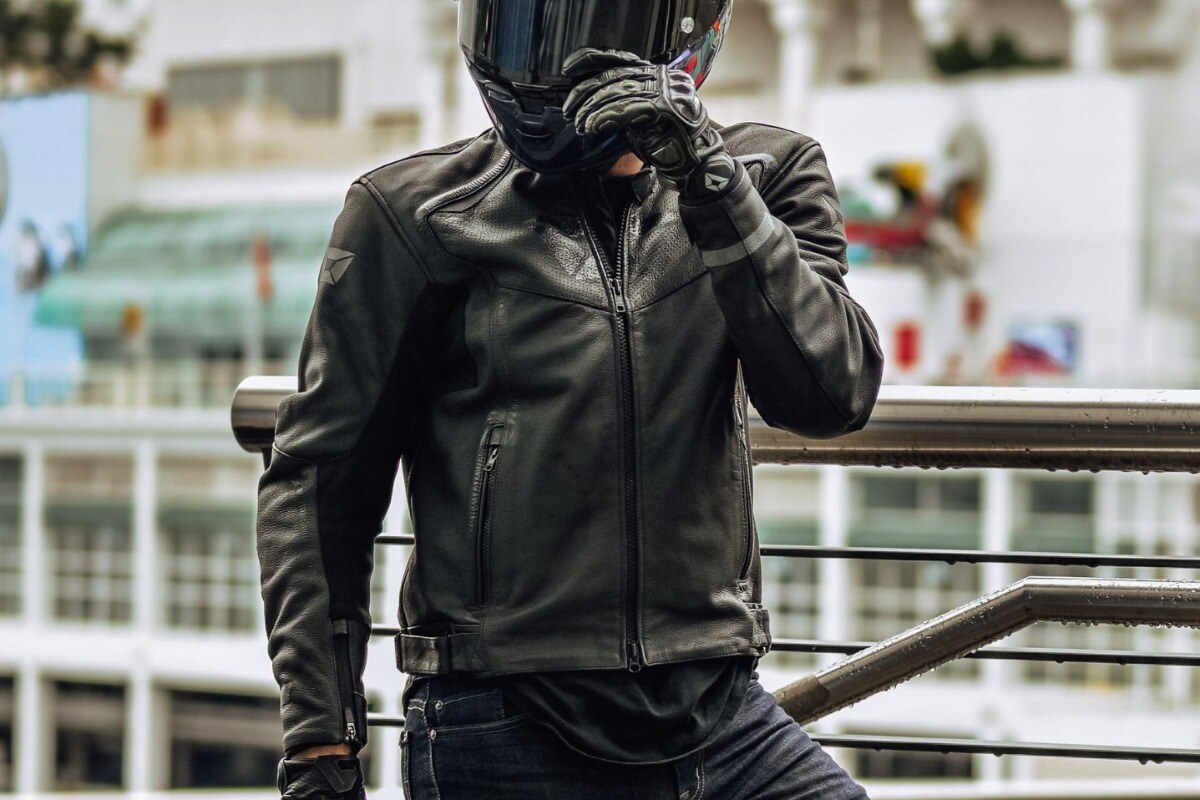 "You'd never guess the Chicane cost less than half of its competitors by the look of it."
"You'd never guess the Chicane cost less than half of its competitors by the look of it."We also dig the Chicane's fairly muted style compared to your typical motorcycle racing jacket, as well as its well-rounded safety features, which include level 1 armor in the elbows and shoulders as well as low-profile reflective graphics for night riding.
The Chicane is tough to fault at this price, but we did note that its armor isn't the most modern. It's a bit bulkier and less flexible than what AStars or Dainese are putting in their gear nowadays, but the fact that it's included at all still adds value to the jacket.
PROS |
CONS |
|
|
CHECK PRICE:
Cortech Chicane Leather Jacket
4. Rev'It! Argon 2 Jacket
There's a lot to love about Rev'It's Argon 2 motorcycle racing jacket, but this one made our list for one reason in particular: it goes for under $500, yet manages to deliver on a rare AAA safety certification.
Rev'it makes this possible by including CE level 2 armor in the shoulders and elbows as standard equipment. The Argon 2 is also designed to accept a level 2 back protector, as well as divided armor panels in the chest if you really want to double down.
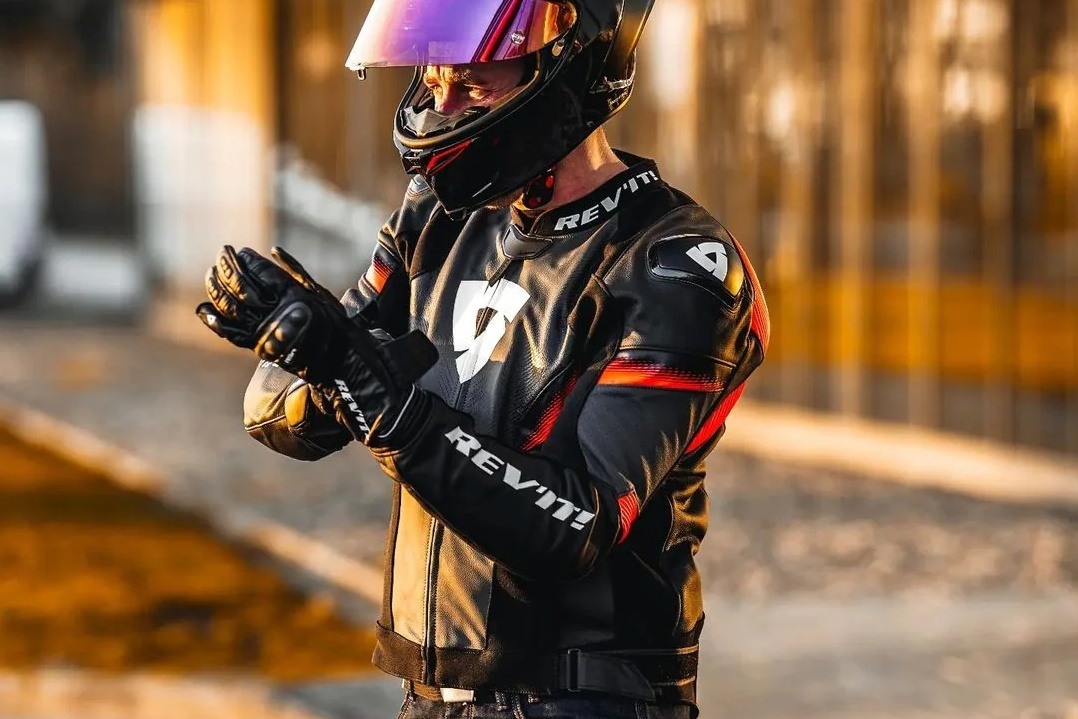 "The Argon 2 delivers a premium look and feel for a few hundred less than flagship offerings from the brand."
"The Argon 2 delivers a premium look and feel for a few hundred less than flagship offerings from the brand."We also dig the Argon 2 for its three-season versatility: light perforation and a fabric-paneled torso keep the jacket cool enough for warmer months, while a high-quality thermal liner lets it work comfortably well into the fall.
We've come to think of the Argon 2 as a high-quality all-rounder, a jack-of-all-trades that checks all the right boxes for a little less cash than most premium offerings. It's by no means cheap, but it delivers above-average protection at a reasonable price.
PROS |
CONS |
|
|
CHECK PRICE:
Rev'it! Argon 2 Jacket
5. Alpinestars Blacktrack Leather Jacket
If you're more interested in a vintage racing vibe, we've been wearing Alpinestars' Blacktrack jacket this season and we absolutely love it. It's got a super clean look, soft leather, and a tailored fit that looks great on and off the bike.
Safety comes courtesy of full-grain, dip-dyed bovine leather, and is backed by thin and flexible CE level 1 armor in the shoulders and elbows. Beefy zippers, shoulder stretch panels, and a minimal badging all add to the Blacktrack's luxurious look and feel.
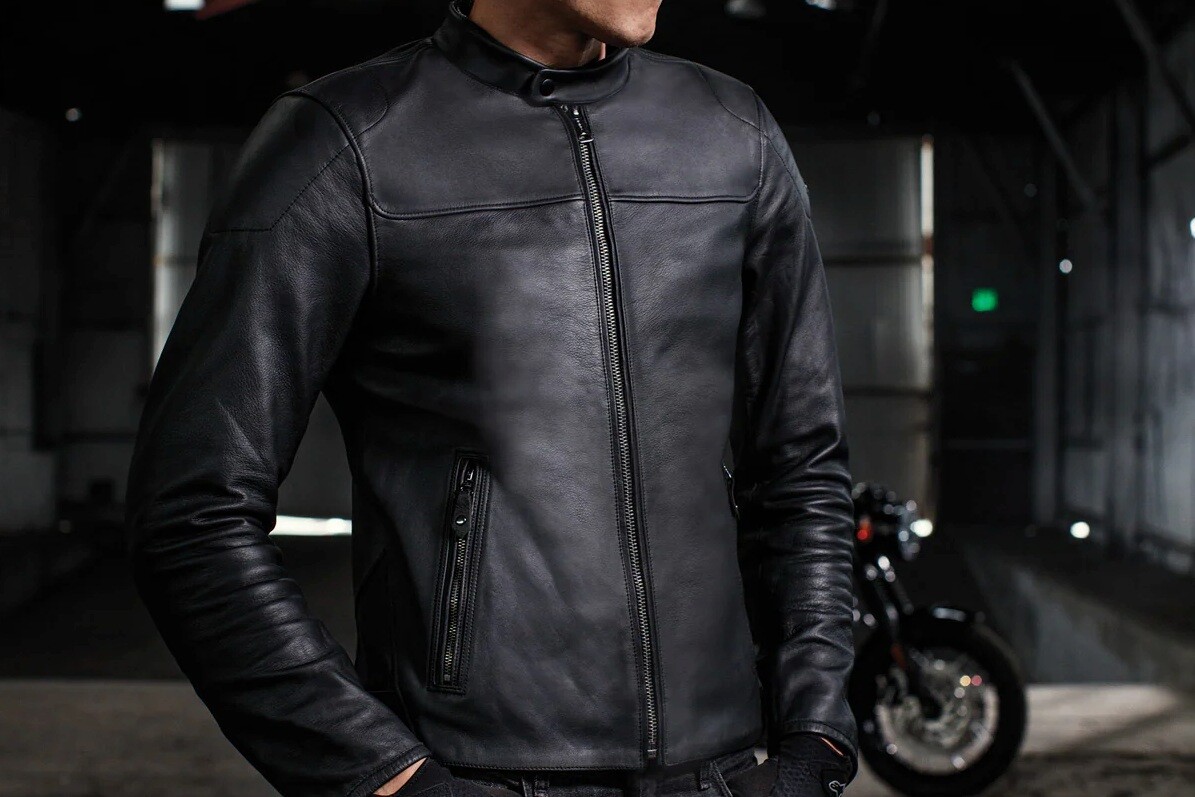 "If track-inspired style isn't your bag, the Blacktrack delivers on the classic cool factor."
"If track-inspired style isn't your bag, the Blacktrack delivers on the classic cool factor."So far we've found this motorcycle racing jacket ideal for peak riding season from spring to early fall, and the included thermal liner adds comfort and versatility in changing conditions. The liner could definitely be warmer, but overall strikes a good balance.
The Blacktrack isn't the sort of thing you'd wear for part-time track duty, but as a daily driver that'll protect your hide on a romp through the canyon, it's an excellent choice. Overall, we think the price is fair, although level 2 armor would add serious value.
PROS |
CONS |
|
|
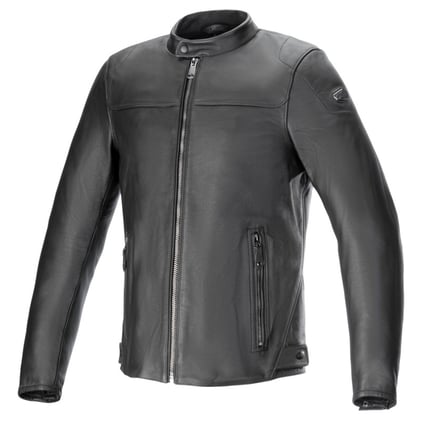
CHECK PRICE:
Alpinestars Blacktrack Leather Jacket
Closing Thoughts on Motorcycle Racing Jackets…
While good motorcycle gear is often expensive, having a well-rounded quiver in your closet can pay serious dividends.
Motorcycle racing jackets may not be the first thing we reach for when heading out for our international adventure touring expeditions, but as a versatile sport touring piece with style to spare, a good leather jacket is tough to beat.
Likewise, if you've got a bike in your garage that's equally at home on the street and the racetrack, a racing jacket pulls double duty for weekend blasts through the twisties and the occasional track day or club racing event.
It's also degrees of magnitude more convenient than a 1-piece suit around town or for the occasional bathroom break (we've got a few horror stories we'll refrain from sharing there), and considerably less expensive as well.
→Read More:
5 Best Motorcycle Luggage Options for the Long Haul
Best Motorcycle Helmet Bags
5 Best Modular Motorcycle Helmets to Keep You Cool This Summer










